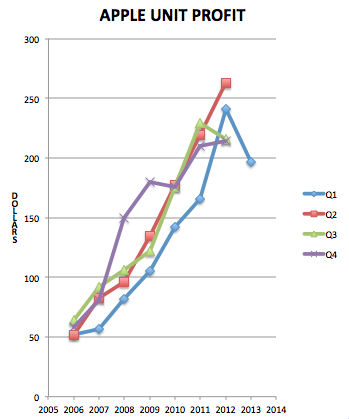Why Apple's Profits Are At Risk

Hello,
I’ve been correctly calling individual stock moves for the last 5 years. I’d like to offer my research to you.
My stock picks have outperformed the market handily. The nice part: You can verify my claim – I blog at SeekingAlpha.com. You can read my articles and note some very timely calls.
For instance, I have been long Apple since 2007 and short Nokia, RIM, and Hewlett-Packard. During a 5-year period, I published over 50 articles explaining why Apple should be bought and its competitors sold. Following my advice would have a portfolio manager’s career as Apple soared and Nokia, RIM, H-P crashed.
I correctly predicted Pilgrim’s Pride’s bankruptcy. Making a bet against that company would have made the portfolio boatloads of cash.
I suggested dumping Bank of America and, instead, buying a small regional bank. Bank of America cratered; the regional soared.
I suggested buying a basket of SaaS stocks in 2011 – all either doubled or were taken out a year later.
More recently, in January, I predicted 7 stocks – Limited Brands, Wynn Resorts, The Buckle, Werner Enterprises, Stamps.com, Armstrong Worldwide, and MTOX Scientific – would announce large special dividends before year’s end. To date, Limited, Wynn, The Buckle, Werner, and Armstrong have all declared special dividends. MTOX didn’t get a chance – it got acquired, giving shareholders a 94% YTD return.
I’d like to offer you or your firm research to help you pick next year’s winners.
I am a retired physician who has been analyzing stocks for 15 years. I publish my market research on SeekingAlpha.com, where I am followed by a number of money managers and analysts. I use a combination of technical and fundamental analysis as well as proprietary metrics. My picks – both long and short – have been very successful. I’d be glad to give you the links to my articles so you can substantiate my claims.
I am eager to share my advice and research on an exclusive basis.
If you’re interested, you can reach me at stephenjrosenman@gmail.com.
Best,
Stephen J. Rosenman
seekingalpha.com/author/stephen-rosenman

No comments:
Post a Comment